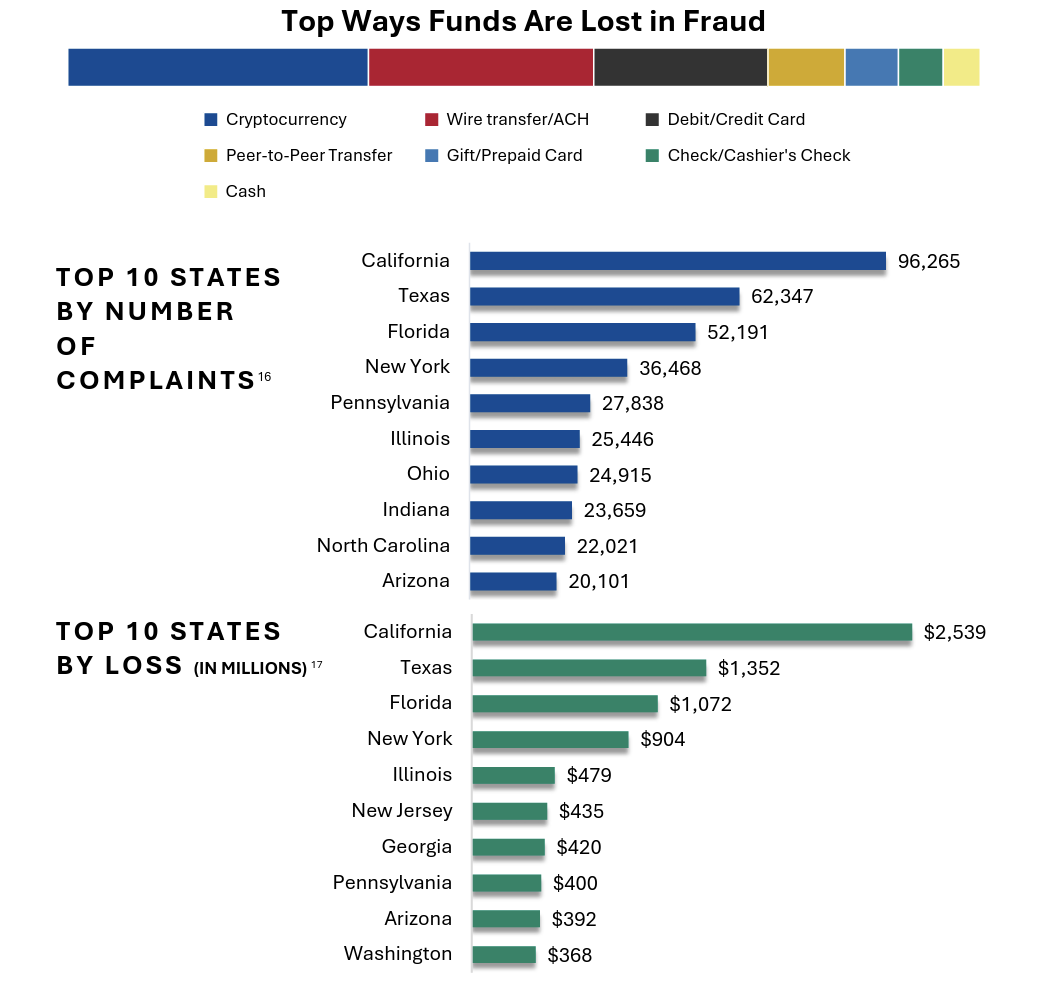.png)
The days of stopping a scam by spotting a typo are gone.
Artificial intelligence is helping criminals up their game – and this year, as a result, Pennsylvanians are on track to lose more money than last year, said Brady Finta with the National Elder Fraud Coordination Center (NEFCC). It could get worse, because scams by phone or online frequently originate from sophisticated networks outside the U.S. and are among the most difficult to investigate and prosecute.
“There is giant generational wealth being lost daily,” Finta said. “In the 90s, we built internet crimes against children task forces all around the United States. In the 2000s, we built joint terrorism task forces all around. It's time we treated elder fraud like those threats because it's that big.”
Last year, Pennsylvanians lost about $400 million to fraud scams and were eighth in the country with most amount of funds stolen, according to a FBI Internet Crime Complaint Center. The commonwealth was fifth in most reports filed to the IC3 at 27,838.
“Allegheny County is such a huge target for scammers because who's more vulnerable? Those with limited technology skills and with more money,” said Cyndie Carioli, senior justice advocate with the Allegheny County District Attorney’s Office.
Carioli also helps lead the Fraud Squad, which alerts older residents about recent scam tactics. Over 21% of people in Allegheny County are 65 or older, about 1% higher than the state average, according to the 2020 U.S. Census.
“There's a new scam every day. It is so easy for older adults just to feel totally overwhelmed by it all and scared of it,” Carioli said

About 12,000 people in the county lost nearly $8 million from scams in 2022, according to the most recent data from the DA’s office.
Carioli said she expects these numbers to be even higher this year and estimates that she has been getting three times the number of complaints compared to last year.
“I kept getting more and more complaints about and questions about deed theft, title, and property damage,” Carioli said.
The “grandparent scam” is also a frequent source of calls to the Fraud Squad. This is a type of fraud where people impersonate a grandchild in urgent need of money, often claiming to be in trouble.
“[It’s] been around for over 20 years. It still gets traction,” Carioli said. “But it's worse now, nationwide because of AI. And so before, people wouldn't necessarily hear their grandkid’s voice, and now they're actually hearing their grandkids.”
Now, a national organization based in San Diego is prioritizing how to address AI-driven scams. The NEFCC, which launched this year, collects and analyzes private and public sector data on crimes affecting older people. The group has two analysts based out of the National Cyber-Forensics & Training Alliance (NCFTA) in Pittsburgh.
“[NCFTA] gives you access to some of the biggest and best companies in America for working against fraud,” said Finta. “They have this model that I don't know if anybody else has. With all of these, private sector companies with public sector law enforcement all working together...they don’t hesitate to look at everything that’s out there.”
Finta, a former FBI supervisory special agent, said there are multiple challenges when it comes to investigating fraud such as thresholds for amount of money stolen, competing priorities, and stolen funds being traced to nations outside the U.S.
“A case that came from the humble beginnings of a single victim could lead to 300 or 500 victims who faced the same thing, but you don’t always have the time or resources to look into it,” Finta said.
Finta said the organization expects to soon bring in a third analyst to be based out of NCFTA.
“This is an epidemic,” Finta said. “What more havoc are [scammers] going to cause with that money...we probably can't arrest our way out of this, but it is super necessary because in my experience, people aren't scared of being caught, of doing this crime.”
Finta said the rapid growth of AI has made recognizing scams harder.
“In the past, there were some pretty good indicators, like spelling is messed up, and it doesn’t read properly,” Finta said. “Now, people that even had hurdles in terms of language and grammar, that's all gone.”
A focus for the group, Finta said, is learning how to use AI to combat crimes committed with AI assistance.
“We collectively need to use AI as much as we can to counter the crooks that are using AI to keep up. Otherwise, we're going to get even further behind,” Finta said.

FBI Pittsburgh Supervisory Special Agent Brooklynn Riordan leads the Complex Financial Crime/Health Care Fraud Squad, one of the largest teams in the office.
“We could open a case a day with the number of reports we get,” Riordan said. “I get calls daily relating to scams...we had a victim [recently] report they had $1 million stolen.”
Last month, the office announced the indictment of a Nigerian man accused of wire fraud and other crimes for theft of over $235,000 from a local university. Agents worked on the case for over two years.
“What the public may not realize is these cases take time, and we have very limited time to try to freeze or seize any of the money stolen,” Riordan said. “Especially with cryptocurrency, money is moved so quickly and to multiple digital wallets.”
Riordan said one of their forensic accountants was able to seize about $7 million in stolen funds last year.
“There is a strong desire to be involved in this work, but it’s a hard skillset to get,” Riordan said. “Technology constantly evolving presents challenges.”
Riordan said investigating cyber-enabled fraud schemes and staying up to date on technological advancements remains a high priority of the office.
“[Fraud] is an egregious loss and harm to the economy, to the individual,” she said. “We are working hard and have great cases.”
Riordan said there are over 100 open cases division wide and encourages those who believe they are the victim of a scam to report it to IC3.
More than 700 people were victims of wire fraud in Pennsylvania since March of this year, according to the FBI Crime Data Explorer, with about half of these resulting in arrests, filing of charges, or turned over to the court of prosecution. In that same period, there have been about 166 offenders. Those numbers do not include data from all law enforcement agencies.
Westmoreland County Chief Deputy Jennifer Shipley said their office has seen an influx in calls regarding fraud scams in the past year, many where someone is impersonating a local official.
“They're identifying themselves as a representative of our agency, and they're informing the individuals that they either have a warrant or warrants for their arrest,” Shipley said. “We’ve heard a number of ways they [scam] from paying with a credit card over the phone to purchasing to now using Bitcoin transfers.”
A few weeks ago, the Sheriff’s office was notified about someone impersonating a Westmoreland County Court of Common Pleas Judge.
“These scammers do this all day, every day...we’re trying to do our best and educating the public about the signs of a scam,” Shipley said.
For more information on what to do if you are the victim of a scam, visit the Federal Trade Commission’s website.
Erin Yudt is a reporter with the Pittsburgh Media Partnership Newsroom, part of the Center for Media Innovation at Point Park University. She most recently was a multimedia content producer and digital reporter at WKBN in Youngstown and is a graduate of Point Park University. Reach her at erin.yudt@pointpark.edu.
The PMP Newsroom is a regional news service that focuses on government and enterprise reporting in southwestern Pennsylvania. Find out more information on foundation and corporate funders here.
Main image: Outside the FBI Pittsburgh office on the South Side. Agents say they continue to receive reports of large amounts of money being stolen in fraudulent schemes. Photograph by Kyle Ferreira.